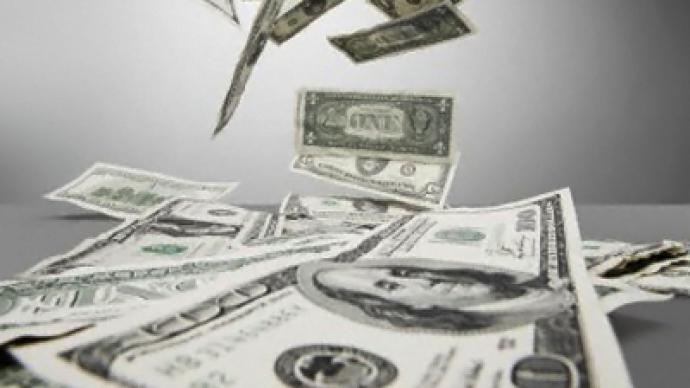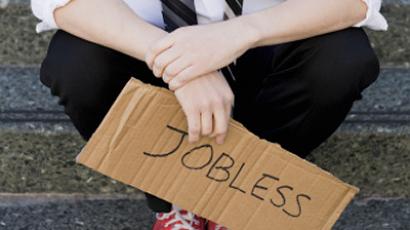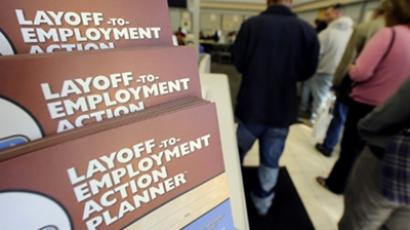Fed paid out trillions in emergency bank loans

The US Federal Reserve released details regarding more than $9 trillion in emergency funding it gave both US and foreign banks during the global financial crisis.
Newly released documents named the companies who received loans and how much each barrowed. The names included Goldman Sachs, Citigroup, JPMorgan Chase, Bank of America Corp. Barclays, Royal Bank of Scotland and Deutche Bank, and others. Each borrowed hundreds of billions of US dollars.The Fed argued the program breaks no rules, however Peter Schiff, the President, Euro Pacific Capital contended that the unilateral decisions made behind closed doors by the organization are unconstitutional and US judges should begin to enforce the law.Banks opted on their own to offer reckless loans and should have to endure the consequences.“We have to have market forces disciplining the credit markets,” he said. “We can’t have the Fed coming to the rescue with a printing press every time somebody gets in trouble,” The programs may have saved Wall Street, but not economy. He argued the US economy is drowning in more debt, a US dollar currency crisis is coming, and the American economy will continue to suffer.“We’re going to have a much bigger economic crisis in the United States sometime in the next several years than the one the Fed thinks they obverted,” Shiff said.He explained US government regulations created problem, the government then created more regulations to circumvent the problems, but the initial damage had already damaged the economy. The new regulations did not help, but also hindered.The US economy is suffering; the US dollar has lost its strength and is being propped up by central banks elsewhere. Nations the world over are beginning to shift away from the dollar and back to their national currencies as a base reserve. To fix the problem he argued the government must stop passing out bailouts, both to banks and individuals; including the America unemployed.“We shouldn’t have bailed out Wall Street. We should have let banks fail, we should have let investment bankers and traders join the ranks of the unemployed,” Shiff commented. “Just because we bailed out Wall Street doesn’t mean we keep extending unemployment benefits in perpetuity, because these unemployment benefits act as a barrier to jobs. When you make it very lucrative for people not to work, they prefer unemployment to work.” He argued American’s need to return to work, even in low paying positions, to contribute to economic productivity in order to turn the economy around. Karl Denninger from The Market Ticker explained the Federal Reserve Charter allows the Fed to make loans to anyone, for any reason they themselves deem appropriate. “That was the excuse used to make these loans,” he said. The Fed essentially took bad collateral for security in order to grant the loans, explained Denninger. But the question remains, what happened to the bad assets used as collateral? They have yet to be written off, so the banks may still be holding the bad assets which could mean the banks themselves are currently insolvent. The US government is sending an interesting message with its continued bailouts of Wall Street. Wall Street banks go to Washington and scare Congress into bailing them out, explained Denninger. “They say give us this money or we’re going to collapse and when we do there will be tanks in the street and you will have marshal law, and Congress bought it,” he said.On the other end, unemployed Americans who are losing their benefits do not scare Congress.“They [Congress] say, you have had 99 weeks, you should have gone and got a job,” explained Denninger. “You can’t just keep handing out money forever.”
This is simply how the system now works in America, explained financial analyst Edward Harrison.“If you really need to get some money, you just have to go to Uncle Fed and they’ll bail you out,” he said jokingly. But, the fact the banks had to repeatedly go to the Fed for help tells us something was seriously wrong. “We’re still on that drip of free money for the banking industry,” said Harrison “They’re not out of the woods.”Americans understand this was a large sum of money, and are not interested in seeing these kinds of bailouts happening again. Thus, the banks are doing their best to take as much as they can now to capitalize now in the case things get worse later on.Crony capitalism continues in the US, argued Harrison. The same politicians who are bailing out Wall Street are saying no to extending benefits to millions of unemployed Americans. “We need to put an end to this as soon as possible,” he said.














